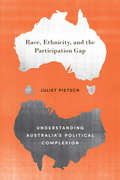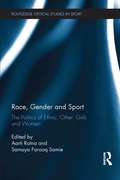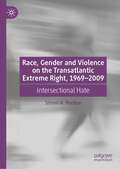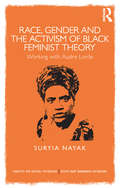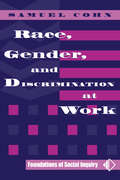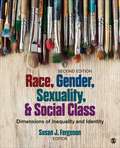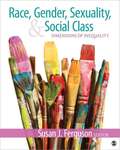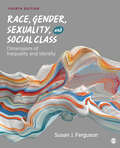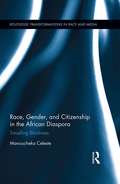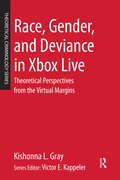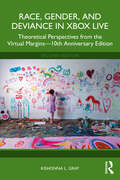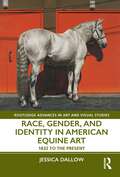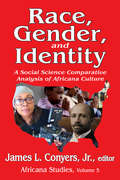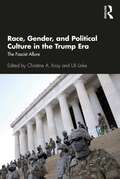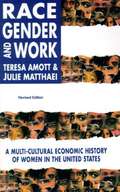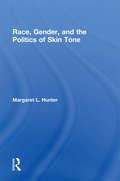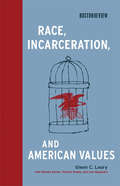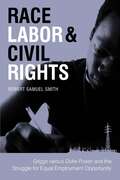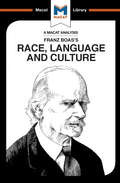- Table View
- List View
Race, Ethnicity, and the Participation Gap: Understanding Australia's Political Complexion (G - Reference, Information and Interdisciplinary Subjects)
by Juliet PietschRace, Ethnicity, and the Participation Gap begins with the argument that political institutions in settler and culturally diverse societies such as Australia, the United States, and Canada should mirror their culturally diverse populations. Compared to the United States and Canada, however, Australia has very low rates of immigrant and ethnic minority political representation in the Commonwealth Parliament, particularly in the House of Representatives. The overall existence of racial hierarchies within formal political institutions represents an inconsistency with the democratic ideals of representation and accountability in pluralist societies. Drawing on findings from the United States, Canada, and Australia, Juliet Pietsch reveals that the lack of political representation in Australia is significant when compared to the United States and Canada, revealing a serious democratic deficit. Her book is devoted to exploring this central puzzle: why is it that, despite having a similar history to other settler countries, Australia shows such comparatively low rates of political participation among its immigrant and ethnic minority populations from non-British and European backgrounds? In addressing this crucial question, Race, Ethnicity, and the Participation Gap examines the impact of Australia’s alternative path on the political representation of immigrants and ethnic minorities.
Race, Gangs and Youth Violence: Policy, Prevention and Policing
by Anthony GunterThis book aims to challenge current thinking about serious youth violence and gangs, and their racialisation by the media and the police. Written by an expert with over 14 years’ experience in the field, it brings together research, theory and practice to influence policy. Placing gangs and urban violence in a broader social and political economic context, it argues that government-led policy and associated funding for anti-gangs work is counter-productive. It highlights how the street gang label is unfairly linked by both the news-media and police to black (and urban) youth street-based lifestyles/cultures and friendship groups, leading to the further criminalisation of innocent black youth via police targeting. The book is primarily aimed at practitioners, policy makers, academics as well as those community-minded individuals concerned about youth violence and social justice.
Race, Gender and Sport: The Politics of Ethnic 'Other' Girls and Women (Routledge Critical Studies in Sport)
by Aarti Ratna Samaya F. SamieThe experiences of ethnic ‘Other’ females have – until recently – been widely overlooked in the study of sport. There continues to be a need to produce critical scholarship about ethnic 'Other' girls and women in sport and physical culture, in order to represent their complex, multifarious and dynamic lived realities. This international collection of critical essays provides compelling insight into the lived realities of ethnic ‘Other’ females in sport. Throughout the book, contributors either draw on the political consciousnesses of ‘Other’ feminisms, or privilege the voices of ethnic 'Other' girls and women so as to broaden, diversify and advance critical thinking pertaining to ethnic ‘Other’ females in sport and physical culture. The purpose of the collection is both to produce knowledge and privilege otherwise subjugated knowledges, which individually and collectively present counter-narratives that better speak to the lived realities of racially oppressed groups of women and girls. Race, Gender and Sport: The Politics of Ethnic 'Other' Girls and Women is important reading for all students and scholars with an interest in the sociology of sport, gender studies, or race and ethnicity studies.
Race, Gender and Violence on the Transatlantic Extreme Right, 1969–2009: Intersectional Hate
by Simon A. PurdueThis book explores the central role that gender has historically played in violent far-right movements and groups, in a time of increasing political polarisation and rising extremism. The author examines the way neo-Nazis and white supremacists have constructed gender, and how this has impacted on the practical role of men and women on the global extreme right between 1969 and 2009, giving valuable insight into the inner workings of the extremist fringe today. In the context of rising violent ultra-nationalism in the UK, Eastern Europe, the USA, India and Russia, this transnational history of racist extremist movements offers a very necessary glimpse into the intimate, personal politics of organised hate, and into the ideological and organisational roots of our current moment. In order to fully understand the extreme right, it is essential to develop an awareness of the deep social foundations that underlie it. By exposing the gendered basis of racist extremism in the USA and UK, this book makes a necessary intervention in the field of far-right studies, shedding new light on the shadowy corners of the political spectrum and ultimately opening new avenues for countering hate on the personal, political and academic level. The book seeks to explain the intricate relationship between organised racist extremism and ideological misogyny, and explores the fundamental contradictions and inconsistencies that underlie women’s far-right activism. Offering historical context to the current social and political moment in which white supremacist and far-right terror presents an immediate threat to security and stability in both the USA and the UK, this book provides useful insights for those researching the history of fascism and the far-right, violent social movements and political activism, as well as women’s history and gender studies.
Race, Gender and the Activism of Black Feminist Theory: Working with Audre Lorde (Concepts for Critical Psychology)
by Suryia NayakBeginning from the premise that psychology needs to be questioned, dismantled and new perspectives brought to the table in order to produce alternative solutions, this book takes an unusual transdisciplinary step into the activism of Black feminist theory. The author, Suryia Nayak, presents a close reading of Audre Lorde and other related scholars to demonstrate how the activism of Black feminist theory is concerned with issues central to radical critical thinking and practice, such as identity, alienation, trauma, loss, the position and constitution of individuals within relationships, the family, community and society. Nayak reveals how Black feminist theory seeks to address issues that are also a core concern of critical psychology, including individualism, essentialism and normalization. Her work grapples with several issues at the heart of key contemporary debates concerning methodology, identity, difference, race and gender. Using a powerful line of argument, the book weaves these themes together to show how the activism of Black feminist theory in general, and the work of Audre Lorde in particular, can be used to effect social change in response to the damaging psychological impact of oppressive social constructions. Race, Gender and the Activism of Black Feminist Theory will be of great interest to advanced students, researchers, political activist and practitioners in psychology, counselling, psychotherapy, mental health, social work and community development.
Race, Gender and the Body in British Immigration Control
by Evan Smith Marinella MarmoThis book analyses the practice of virginity testing endured by South Asian women who wished to enter Britain between the late 1960s and the early 1980s, and places this practice into a wider historical context. Using recently opened government documents the extent to which these women were interrogated and scrutinized at the border is uncovered.
Race, Gender, And Discrimination At Work
by Samuel CohnRace, Gender, and Discrimination at Work is a review of the determinants of wage and employment discrimination by firms against minorities and women. Aimed at sociology undergraduates, the book assumes no pre-existing social scientific knowledge. Downplaying family and cultural factors in favour of an analysis of the roles played by organizational,
Race, Gender, Sexuality, And Social Class: Dimensions Of Inequality And Identity
by Susan J. FergusonAn eye-opening exploration of how socials statuses intersect to shape our identities and produce inequalities. In this fully edited and streamlined Race, Gender, Sexuality, and Social Class: Dimensions of Inequality and Identity, Second Edition, Susan Ferguson has carefully selected readings that open readers’ eyes to the ways that social statuses shape our experiences and impact our life chances. The anthology represents many of the leading voices in the field and reflects the many approaches used by scholars and researchers to understand this important and evolving subject. The anthology is organized around broad topics (Identity, Power and Privilege, Social Institutions, etc.), rather than categories of difference (Race, Gender, Class, Sexuality) to underscore this fundamental insight: race, class, gender, and sexuality do not exist in isolation; they often intersect with one another to produce social inequalities and form the bases of our identities in society.
Race, Gender, Sexuality, and Social Class: Dimensions of Inequality
by Susan J. FergusonRace, Gender, Sexuality, and Social Class: Dimensions of Inequality, edited by renowned researcher and scholar Susan Ferguson, presents a contemporary and compelling overview of race, ethnicity, gender, and social class issues in the United States today. Taking an intersectional approach, the book is organized topically, rather than focusing on specific race/ethnic subgroups. The content is framed around the themes of identity, experiences of race, class, gender or sexuality, difference, inequality, and social change or personal empowerment, with historical context threaded throughout to deepen the reader's understanding. With engaging readings and cutting-edge scholarship the collection is not only refreshingly contemporary but also relevant to students’ lives.
Race, Gender, Sexuality, and Social Class: Dimensions of Inequality and Identity
by Susan J. FergusonRace, Gender, Sexuality, and Social Class, Fourth Edition is an anthology of readings that explores the ways these social statuses shape our experiences and impact our life chances in society today. Organized around broad topics (identity, power and privilege, social institutions, etc.), rather than categories of difference (race, gender, class, sexuality), to underscore the idea that social statuses often intersect with one another to produce inequalities and form the bases of our identities in society. The text features readings by leading experts in the field and reflects the many approaches scholars and researchers use to understand issues of diversity, power, and privilege. Included with this title: LMS Cartridge: Import this title′s instructor resources into your school′s learning management system (LMS) and save time. Don′t use an LMS? You can still access all of the same online resources for this title via the password-protected Instructor Resource Site. Learn more.
Race, Gender, Sexuality, and Social Class: Dimensions of Inequality and Identity
by Susan J. FergusonRace, Gender, Sexuality, and Social Class, Fourth Edition is an anthology of readings that explores the ways these social statuses shape our experiences and impact our life chances in society today. Organized around broad topics (identity, power and privilege, social institutions, etc.), rather than categories of difference (race, gender, class, sexuality), to underscore the idea that social statuses often intersect with one another to produce inequalities and form the bases of our identities in society. The text features readings by leading experts in the field and reflects the many approaches scholars and researchers use to understand issues of diversity, power, and privilege. Included with this title: LMS Cartridge: Import this title′s instructor resources into your school′s learning management system (LMS) and save time. Don′t use an LMS? You can still access all of the same online resources for this title via the password-protected Instructor Resource Site. Learn more.
Race, Gender, and Citizenship in the African Diaspora: Travelling Blackness (Routledge Transformations in Race and Media)
by Manoucheka CelesteWinner of the National Communication Association's 2018 Diamond Anniversary Book Award With the exception of slave narratives, there are few stories of black international migration in U.S. news and popular culture. This book is interested in stratified immigrant experiences, diverse black experiences, and the intersection of black and immigrant identities. Citizenship as it is commonly understood today in the public sphere is a legal issue, yet scholars have done much to move beyond this popular view and situate citizenship in the context of economic, social, and political positioning. The book shows that citizenship in all of its forms is often rhetorically, representationally, and legally negated by blackness and considers the ways that blackness, and representations of blackness, impact one’s ability to travel across national and social borders and become a citizen. This book is a story of citizenship and the ways that race, gender, and class shape national belonging, with Haiti, Cuba, and the United States as the primary sites of examination.
Race, Gender, and Class in Criminology: The Intersections (Routledge Library Editions: Women and Crime #4)
by Martin D. Schwartz Dragan MilovanovicThese essays, first published in 1996, focus on class, race, and gender as organising and analytical concepts in criminology. For many years, their importance in studying how the world relates to crime and its control was minimized or ignored. It is clear, however, that these concepts are of critical importance in understanding societal issues, especially crime and societal responses to it. This title will be of interest to students of criminology.
Race, Gender, and Deviance in Xbox Live: Theoretical Perspectives from the Virtual Margins
by Kishonna L. GrayRace, Gender, and Deviance in Xbox Live provides a much-needed theoretical framework for examining deviant behavior and deviant bodies within one of the largest virtual gaming communities—Xbox Live. Previous research on video games has focused mostly on violence and examining violent behavior resulting from consuming this medium. This limited scope has skewed criminologists' understanding of video games and video game culture. Xbox Live has proven to be more than just a gaming platform for users. It has evolved into a multimedia entertainment outlet for more than 20 million users. This book examines the nature of social interactions within Xbox Live, which are often riddled with deviant behavior, including but not limited to racism and sexism. The text situates video games within a hegemonic framework deploying whiteness and masculinity as the norm. The experiences of the marginalized bodies are situated within the framework of deviance as they fail to conform to the hegemonic norm and become victims of racism, sexism, and other types of harassment.
Race, Gender, and Deviance in Xbox Live: Theoretical Perspectives from the Virtual Margins—10th Anniversary Edition
by Kishonna L. GrayBy focusing on the experiences of users, gamers, and audiences inside one of the world’s largest gaming communities (Xbox Live), this book provides an overview of the landscape, architecture, and socio-technical structure of console gaming. Building on previous research regarding race, gender, and technology, it provides a much-needed intersectional approach to virtual gaming communities. It draws from a wide breadth of disciplines and interviews with minoritized and marginalized users to offer an overview of the virtual oppressions these individuals navigate and resist.In this 10th Anniversary Edition, author Kishonna L. Gray introduces the audience to a perspective on console gaming environments called “Multi-mediated Interactive Console Environments.” This new chapter provides a necessary understanding of these dynamic digital communities, adding console games, which have been heretofore left out of conversations on gaming, to platform studies, and addressing troubling examples on race, gender, and other identities. While the majority of scholarship on gaming comes from disciplines related to media studies and communication, it is imperative that other scholars engage the narrative and help move the focus on gaming beyond acts of violence or as a space that propels the military–industrial complex.By bringing together cultural studies, criminology, media studies, game studies, and others, this text offers interdisciplinary approaches to making sense of not only the technology and its impact on users and cultures but also the impact that (sub) cultures have had on gaming. It is essential reading for scholars and practitioners seeking solutions to some of gaming’s biggest challenges such as how to reduce harm in online gaming.
Race, Gender, and Identity in American Equine Art: 1832 to the Present (Routledge Advances in Art and Visual Studies)
by Jessica DallowThis book traces an evolution of equine and equestrian art in the United States over the last two centuries to counter conventional understandings of subjects that are deeply enmeshed in the traditions of elite English and European culture. In focusing on the construction of identity in painting and photography—of Blacks, women, and the animals themselves involved in horseracing, rodeo, and horse show competition—it illuminates the strategic and varying roles visual artists have played in producing cultural understandings of human-animal relationships. As the first book to offer a history of American equine and equestrian imagery, it shrinks the chasm of literature on the subject and illustrates the significance of the genre to the history of American art. This book further connects American equine and equestrian art to historical, theoretical, and philosophical analyses of animals and attests to how the horse endures as a vital, meaningful subject within the art world as well as culture at large. This book will be of interest to scholars in art history, American art, gender studies, race and ethnic studies, and animal studies.
Race, Gender, and Identity: A Social Science Comparative Analysis of Africana Culture (Africana Studies)
by James L. ConyersThis volume examines race, gender, and identity in African American culture. As with previous volumes in the series, these collected essays provide a social science and interdisciplinary framework for the exploration of Africana cultural and social phenomena. The contributors have adopted mixed methods and meta-theory tools of analysis to describe and evaluate these issues from an African-centered perspective.Kameelah Martin examines the role of women in the films of Julie Dash and Kasi Lemmons. Toya Roberts offers an experimental study of African American males at predominantly white institutions of higher education. Rochelle Brocks digs into the transition, transformation, and transcendence of civil rights to the Black Arts/Black Power movements for social change. Portia K. Maultsby provides an ethnographic study, inspecting the genre of funk music in the United States. James L. Conyers, Jr. analyzes the doctoral dissertation of W. E. B. Du Bois, which cataloged the impact of colonialism on Africana culture. Kesha Morant Williams and Ronald L. Jackson II examine the impact of lupus on the identity of African American women. Ronald Turner's essay examines black workers challenging racist practices by their union representatives. Lisbeth Gant-Britton renders a conceptual history of the hip-hop community, with emphasis on international issues. This volume is an invaluable sourcebook for those studying African American affairs, history, and cultural studies.
Race, Gender, and Leadership in Nonprofit Organizations
by Marybeth Gasman Noah D. Drezner Edward Epstein Tyrone Freeman Vida L. AveryThis volume centers on the lives and experiences of female and African American leaders of foundations and nonprofits. Contributors to the volume examine race and gender as constructs and provide a theoretical background for understanding their effect on the psycho-social development of the individuals.
Race, Gender, and Political Culture in the Trump Era: The Fascist Allure
by Uli Linke Christine A. KrayThis book demonstrates the fragility of democratic norms and institutions, and the allure of fascist politics within the Trump era. The chapters consider the antagonistic cultural practices through which divergent political machinations, including white (patriarchal) nationalism, are staged, and examine the corresponding policies and governing practices that threaten the civil rights, security, and wellbeing of racialized minorities, immigrants, women, and gender nonconforming people. The book contributes to social theory on nation-building by delineating processes of exclusion, intimidation, and violence, with a focus on rhetoric, performance, semiotics, music, affectivity, and the power of media. Various chapters also analyze creative, restorative, and at times unruly practices of community building, which reknit the social fabric with expansive visions of the polity. This anthropology-led volume incorporates contributions from a number of disciplines including sociology, American studies, communication, and Spanish, and will be of interest to scholars across the social sciences and humanities.
Race, Gender, and Work: A Multi-cultural Economic History of Women in the United States
by Teresa Amott Julia A. MattaeiThe lives of working women and their contributions to American economic history are considered in a fine blend of biography and social and political history.
Race, Gender, and the Politics of Skin Tone
by Margaret L. HunterRace, Gender, and the Politics of Skin Tone tackles the hidden yet painful issue of colorism in the African American and Mexican American communities. Beginning with a historical discussion of slavery and colonization in the Americas, the book quickly moves forward to a contemporary analysis of how skin tone continues to plague people of color today. This is the first book to explore this well-known, yet rarely discussed phenomenon.
Race, Incarceration, and American Values
by Glenn C. LouryThe United States, home to five percent of the worlds' population, now houses twenty-five percent of the world's prison inmates. Our incarceration rate--at 714 per 100,000 residents and rising--is almost forty percent greater than our nearest competitors (the Bahamas, Belarus, and Russia). More pointedly, it is 6.2 times the Canadian rate and 12.3 times the rate in Japan. Economist Glenn Loury argues that this extraordinary mass incarceration is not a response to rising crime rates or a proud success of social policy. Instead, it is the product of a generation-old collective decision to become a more punitive society. He connects this policy to our history of racial oppression, showing that the punitive turn in American politics and culture emerged in the post-civil rights years and has today become the main vehicle for the reproduction of racial hierarchies. Whatever the explanation, Loury agues, the uncontroversial fact is that changes in our criminal justice system since the 1970s have created a nether class of Americans--vastly disproportionately black and brown--with severely restricted rights and life chances. Moreover, conservatives and liberals agree that the growth in our prison population has long passed the point of diminishing returns. Stigmatizing and confining of a large segment of our population should be unacceptable to Americans. Loury's call to action makes all of us now responsible for ensuring that the policy changes. Praise for The Anatomy of Racial Inequality: "Intellectually rigorous and deeply thoughtful.... The Anatomy of Racial Inequalityis an incisive, erudite book by a major thinker." --Gerald Early, New York Times Book Review A Boston Review Book
Race, Incarceration, and American Values (Boston Review Books)
by Glenn C. LouryWhy stigmatizing and confining a large segment of our population should be unacceptable to all Americans.The United States, home to five percent of the world's population, now houses twenty-five percent of the world's prison inmates. Our incarceration rate—at 714 per 100,000 residents and rising—is almost forty percent greater than our nearest competitors (the Bahamas, Belarus, and Russia). More pointedly, it is 6.2 times the Canadian rate and 12.3 times the rate in Japan. Economist Glenn Loury argues that this extraordinary mass incarceration is not a response to rising crime rates or a proud success of social policy. Instead, it is the product of a generation-old collective decision to become a more punitive society. He connects this policy to our history of racial oppression, showing that the punitive turn in American politics and culture emerged in the post-civil rights years and has today become the main vehicle for the reproduction of racial hierarchies. Whatever the explanation, Loury argues, the uncontroversial fact is that changes in our criminal justice system since the 1970s have created a nether class of Americans—vastly disproportionately black and brown—with severely restricted rights and life chances. Moreover, conservatives and liberals agree that the growth in our prison population has long passed the point of diminishing returns. Stigmatizing and confining of a large segment of our population should be unacceptable to Americans. Loury's call to action makes all of us now responsible for ensuring that the policy changes.
Race, Labor, and Civil Rights: Griggs versus Duke Power and the Struggle for Equal Employment Opportunity (Making the Modern South)
by Robert Samuel SmithIn 1966, thirteen black employees of the Duke Power Company's Dan River Plant in Draper, North Carolina, filed a lawsuit against the company challenging its requirement of a high school diploma or a passing grade on an intelligence test for internal transfer or promotion. In the groundbreaking decision Griggs v. Duke Power (1971), the United States Supreme Court ruled in favor of the plaintiffs, finding such employment practices violated Title 7 of the Civil Rights Act of 1964 when they disparately affected minorities. In doing so, the court delivered a significant anti-employment discrimination verdict. Legal scholars rank Griggs v. Duke Power on par with Brown v. Board of Education (1954) in terms of its impact on eradicating race discrimination from American institutions. In Race, Labor, and Civil Rights, Robert Samuel Smith offers the first full-length historical examination of this important case and its connection to civil rights activism during the second half of the 1960s. Smith explores all aspects of Griggs, highlighting the sustained energy of the grassroots civil rights community and the critical importance of courtroom activism. Smith shows that after years of nonviolent, direct action protests, African Americans remained vigilant in the 1960s, heading back to the courts to reinvigorate the civil rights acts in an effort to remove the lingering institutional bias left from decades of overt racism. He asserts that alongside the more boisterous expressions of black radicalism of the late sixties, foot soldiers and local leaders of the civil rights community -- many of whom were working-class black southerners -- mustered ongoing legal efforts to mold Title 7 into meaningful law. Smith also highlights the persistent judicial activism of the NAACP-Legal Defense and Education Fund and the ascension of the second generation of civil rights attorneys. By exploring the virtually untold story of Griggs v. Duke Power, Smith's enlightening study connects the case and the campaign for equal employment opportunity to the broader civil rights movement and reveals the civil rights community's continued spirit of legal activism well into the 1970s.
Race, Language and Culture
by Anna Seiferle-ValenciaFranz Boas’s 1940 Race, Language and Culture is a monumentally important text in the history of its discipline, collecting the articles and essays that helped make Boas known as the ‘father of American anthropology.’ An encapsulation of a career dedicated to fighting against the false theories of so-called ‘scientific racism’ that abounded in the first half of the 20th-century, Race, Language and Culture is one of the most historically significant texts in its field – and central to its arguments and impact are Boas’s formidable interpretative skills. It could be said, indeed, that Race, Language and Culture is all about the centrality of interpretation in questioning our assumptions about the world. In critical thinking, interpretation is the ability to clarify and posit definitions for the terms and ideas that make up an argument. Boas’s work demonstrates the importance of another vital element: context. For Boas, who argued passionately for ‘cultural relativism,’ it was vital to interpret individual cultures by their own standards and context – not by ours. Only through comparing and contrasting the two can we reach, he suggested, a better understanding of humankind. Though our own questions might be smaller, it is always worth considering the crucial element Boas brought to interpretation: how does context change definition?
